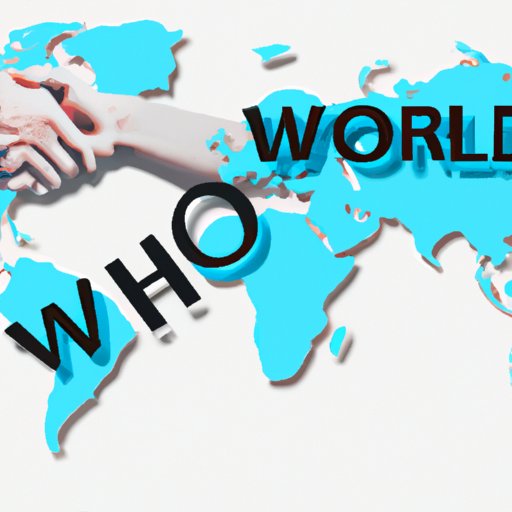
Introduction
The World Health Organization (WHO) is an international organization that works to promote health, prevent diseases, and improve healthcare systems worldwide. As an essential component of the United Nations system, the WHO plays a critical role in shaping the global health agenda and responding to emergency health crises. This article aims to provide an overview of the WHO’s purpose and goals, its historical evolution, its impact on global health issues, its vision for universal health coverage and partnership collaborations, and the challenges and opportunities it faces in the 21st century. This article is intended for anyone interested in learning more about global health, the WHO’s work and its significance for public health worldwide.
Understanding the Purpose and Goals of the World Health Organization
The WHO’s purpose is to promote health, keep the world safe, and serve the vulnerable. Its mission is to provide leadership on global health matters, shape the health research agenda, set norms, and standards, articulate evidence-based policy options, and monitor health trends and assure health security. Some of the WHO’s goals include addressing global health issues, such as infectious diseases, maternal and child health, noncommunicable diseases, promoting healthy lifestyles, strengthening health systems, and addressing emergencies and disasters.
The Evolution of the World Health Organization: A Historical Perspective
Founded in 1948, the WHO has its roots in nineteenth-century international sanitary conferences and the League of Nations Health Organization. Throughout its history, the WHO has evolved in response to changing global health challenges and opportunities. It began by addressing infectious diseases such as malaria, tuberculosis, and smallpox. Over time, the organization expanded to address maternal and child health, nutrition, mental health, and noncommunicable diseases such as cancer and heart disease. In 2003, the organization was confronted with the SARS epidemic, which highlighted the importance of emergency response and strengthened the WHO’s role in managing public health emergencies.
Tackling Global Health Issues: The World Health Organization’s Role and Impact
The WHO is involved in addressing numerous global health issues, from infectious diseases such as COVID-19, HIV/AIDS, and Ebola to noncommunicable diseases, mental health, and environmental health. As a global health leader, the WHO plays a critical role in generating evidence through research, setting global norms and standards, and facilitating international cooperation and coordination. The WHO’s impact is reflected in its successes, such as smallpox eradication, polio eradication, and progress towards reducing maternal and child mortality.
Achieving Universal Health Coverage: The World Health Organization’s Vision
Universal Health Coverage (UHC) is a vision to ensure that all people can access affordable and quality health services without facing financial hardship. The WHO aims to achieve this vision through improving health system performance, addressing social determinants of health, promoting equity, and increasing financial risk protection through health financing reforms. The WHO also works to harness cutting-edge technologies and innovations to improve health outcomes and services.
Fighting Emerging Diseases: The World Health Organization’s Response Strategies
Emerging diseases pose a significant threat to global health security. The WHO responds to emerging diseases through early detection and response, risk assessment, communication, and coordination with partner organizations. The WHO played a critical role in responding to the Ebola virus outbreak in West Africa, leading multisectoral, global efforts to contain the spread of the illness, providing technical assistance, and supporting countries in enhancing their surveillance, response, and preparedness capacities.
Collaborating for Better Health: Partnerships of the World Health Organization
The WHO recognizes the importance of partnerships in achieving global health goals. The organization partners with governments, civil society organizations, academia, and the private sector to leverage expertise, resources, and innovation to advance public health. Some successful partnerships include the Global Polio Eradication Initiative, the Stop TB Partnership, the Roll Back Malaria Partnership, and the Global Fund to Fight AIDS, Tuberculosis, and Malaria.
Challenges and Opportunities for the World Health Organization in the 21st Century
The WHO faces several challenges in the 21st century, including funding challenges, health workforce shortages, health system weaknesses, and emerging diseases. Nevertheless, the WHO also has opportunities to make a significant difference in global health. One opportunity is to utilize digital health technologies to improve health outcomes, reduce health disparities, and enhance epidemic preparedness, and response. Another opportunity is to prioritize the health needs of vulnerable populations, such as refugees, migrants, and people affected by humanitarian crises and conflicts.
Conclusion
The WHO is a critical global health organization that plays an essential role in promoting health, preventing diseases, and improving health care systems worldwide. Its work has brought about significant improvements in global health outcomes, from smallpox eradication to reducing child and maternal mortality. Nevertheless, the WHO faces significant challenges, and its work is critical to improving the health and wellbeing of people worldwide. Individuals can support the WHO’s mission by advocating for global health equity, participating in public health campaigns, and donating to organizations that support the WHO’s work.





